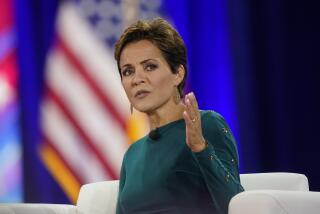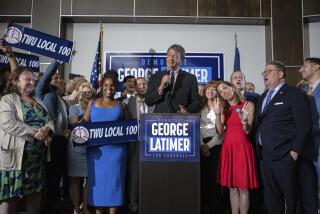Campaigning in New York: A Mine Field of Complex Issues and Big Political Egos
- Share via
NEW YORK — As that trio of presidential contenders, Massachusetts Gov. Michael S. Dukakis, the Rev. Jesse Jackson and Sen. Albert Gore Jr., swept through the Democratic heartland of New York state searching for votes the other day, the headlines were dominated by the home team--Gov. Mario M. Cuomo and Mayor Edward I. Koch.
So what else is new? Welcome to the vortex of New York politics.
Few, if any, primary states can prove so complicated or be so perverse for presidential contenders as New York. Few states present such a mine field of ethnic concerns, racial polarization, chauvinistic personalities, rapacious reporters and sophisticated voters.
“New York is the Lebanon of American politics,” said Joel W. McCleary, who still carries the scars from running Jimmy Carter’s losing New York primary campaign in 1980.
A Sideshow Campaign
In past years, despite its large number of delegates, the New York primary tended to be a semi-entertaining sideshow as voters in states with earlier primaries made the more crucial nominating decisions. A notable exception occurred in 1984, when former Vice President Walter F. Mondale stopped a Gary Hart surge here. This year it is a three-ring, make-or-break political circus, with candidates struggling not only to win 255 convention delegates, but to avoid being devoured by the local lions.
“Look at the size of New York,” said David Garth, the dean of New York political consultants who is trying to navigate Gore through the primary’s sharp reefs. “To say ‘hello’ you need a million dollars in media. In most states, a million dollars would wrap it up for you . . . (and) between Koch and Cuomo, there is no room for a candidate to say ‘hello.’
“This is the home base for the media. All these guys (candidates) thought Washington was the center of the world and then they found out New York was the center of the world. There is something humbling about walking between these big buildings.”
McCleary, now a senior executive of the Sawyer/Miller Group, a Manhattan-based political consulting firm, said that “for a campaign manager, this is the greatest graduate workshop in the world. . . . It taught me a lot. I run campaigns all around the world. How can you run a campaign in Nigeria or the Philippines? It is a piece of cake after running a New York campaign.”
A Brew of Issues
In New York, issues such as race, AIDS, urban problems, foreign policy and Israel can make an explosive brew. If racial tensions have worsened since the mob violence in Howard Beach in 1986, the shortage of housing for low-income and middle-class people and the plight of the homeless are constant wounds. New York City has the most AIDS cases in the nation. The drug problem and its associated violence seem unsolvable.
In addition, “you have Northern Ireland and Israel and Hispanic affairs and Haitian affairs. It’s a mine field, and New Yorkers feel very intensely about politics, and everybody is an expert. You have to expect that,” said one veteran political adviser to statewide campaigns.
If there are ordinary experts galore, the power structure also is complicated. “It’s a kind of horizontal pecking order,” Garth said. “In most states it’s vertical. Here, you not only have to go to Albany and pay obeisance, but you have to go to City Hall. It’s also organized Jewry. It’s the cardinal, it’s unionism.”
Stars of the News
New York’s governor and the mayor of New York City are used to being in the headlines and don’t relinquish that place without a struggle. During crucial days for the presidential contenders, the New York papers focused on Cuomo’s semantic gyrations as he tortuously withdrew from his earlier statements that he would be available for a draft at the Democratic National Convention. Newspapers and television reports also focused on Koch’s continuing charges that Jews would be “crazy” to vote for Jackson because of Jackson’s positions on Israel.
Overlying all this is the economic and ethnic diversity of the state. New York is not only the contrasts of Bloomingdale’s, Wall Street, 5th Avenue and the squalor of parts of the South Bronx. Surprisingly to some, New York’s number one industry is agriculture. For politicians, it is a major fund-raising center and an amplifier, through the national media based in Manhattan, to the rest of the country.
Presidential contenders also have to live with the tone of New York politics. “What is it like to campaign? Loud,” William Schneider, political consultant to The Times and resident fellow of the American Enterprise Institute, said. “They yell and scream. It is boisterous. The New York media is not genteel. What would be a rude political epithet in any other state is the normal mode of discourse in New York.”
‘Tough, Ornery’ Press
“The New York press corps is not reticent,” said Gabe Pressmen, the aggressive veteran TV reporter who once managed to drive to the site of a plane crash holding a microphone in one hand, a telephone in the other and somehow controlling the steering wheel. “That tradition goes back to John Peter Zenger (New York editor acquitted of libel in 1735). Even the stupid reporters are descended from John Peter Zenger. We’re all tough and ornery.”
Because of the high cost of paid television time and news broadcasts that go on 24 hours a day, primary campaigns in New York state are forced to put a premium on free publicity in the media.
“You are like a Hollywood producer. You have to create news,” said McCleary, whose candidate lost to Sen. Edward M. Kennedy in the 1980 primary. “Upstate, the media is relatively easy to get. You go in there and do press conferences. Here, in the city, it is much more difficult. You have to be damn good to get on the tube.”
McCleary remembers what it was like in the heat of battle: “Your last priority is to try to survive,” he said, “before the crocodiles get you.”
More to Read
Get the L.A. Times Politics newsletter
Deeply reported insights into legislation, politics and policy from Sacramento, Washington and beyond. In your inbox twice per week.
You may occasionally receive promotional content from the Los Angeles Times.








